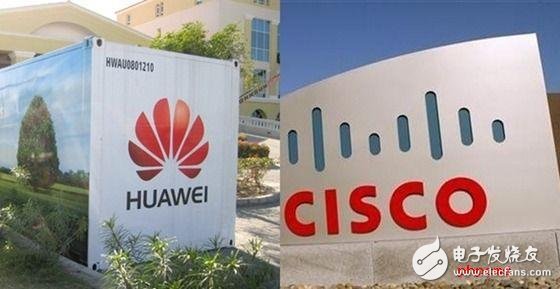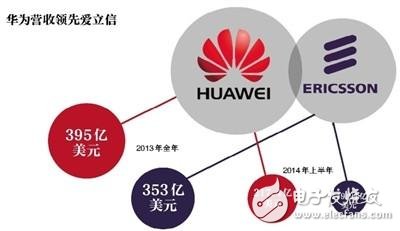Huawei's two major alliances: Ericsson and Cisco will cooperate in all aspects
In the early morning of November 10, Ericsson and Cisco announced that the two companies will establish a wide range of technical and commercial relationships, from the research and development to customer service and other areas of cooperation. The two companies said that the alliance will increase the revenue of each company by more than $1 billion a year by 2018.
In a market environment where competition is fierce and acquisitions are the norm, it is extremely rare to choose alliances. The two companies said in a joint statement that after Nokia’s €15.6 billion acquisition of Alcatel-Lucent, the rise of the company and China’s telecom equipment manufacturer Huawei brought enormous competitive pressure. In view of this, Ericsson and Cisco will cooperate in all aspects, including joint development of products commonly used in wireless networks and Internet infrastructure.

Why is it allied?
Ericsson's revenue in 2014 was SEK 228 billion (US$26.3 billion) and the total number of employees worldwide was approximately 116.62 million. The company currently has approximately 37,000 patents. Cisco's revenue for the previous fiscal year was $49.2 billion. The two companies are the first and second places in the telecommunications market and the online market.
The two companies responded to why they formed an alliance.
Ericsson said that a partnership with Cisco will allow the company to immediately expand the range of products and services offered faster than the company's acquisition or self-development of Internet devices. Ericsson CEO HansVestberg said: "Aligning with Cisco is a more agile and effective choice. We can cooperate tomorrow."
Cisco said that by aligning with Ericsson, companies can quickly enter larger markets without engaging in lengthy M&A negotiations, and cooperation will not create too many business overlaps. Cisco CEO Chuck Robbins said: "This transaction allows us to expand our global business and reach markets that are not currently covered."

As both competitors Nokia and Huawei did not make an official response to the news.
However, Huawei insiders told the "First Financial Daily" reporter that the alliance between the two companies reflects that Huawei's previous judgment on the industry is correct. For the alliance itself, Huawei welcomes more competitors to expand the industry.
The boundaries between telecommunications and the Internet are blurring
Ericsson's revenue in 2014 was SEK 228 billion (US$26.3 billion) and the total number of employees worldwide was approximately 116.62 million. The company currently has approximately 37,000 patents. Cisco's revenue for the previous fiscal year was $49.2 billion. The two companies are the first and second places in the telecommunications market and the online market.
Regarding the alliance, Ericsson said that a partnership with Cisco could allow the company to immediately expand its product and service offerings faster than the company's acquisition or self-development of Internet devices. Cisco said that by aligning with Ericsson, companies can quickly enter larger markets without being involved in lengthy M&A negotiations.
The alliance between the two sides reflects the blurring of the boundaries between telecommunications and Internet networks, which has allowed companies in both markets to consider how to deal with larger markets.
For Ericsson, the alliance can help the company consolidate its position as a global leader in the telecommunications equipment industry because of the strength of rival Nokia. After Nokia completes the acquisition of Alcatel-Lucent, the company will not only have the strength to challenge Ericsson in the wireless device market, but also to attack the Internet device leader Cisco.
Another competitor, Huawei, also completed the integration of telecom services and network services a few years ago, and set up carrier business BG and enterprise business BG to grab the market. Coupled with consumer BG's business, Huawei has surpassed Ericsson in revenue in the first half of 2015, which is twice the equivalent of the latter.
In contrast, the pace of the transformation of the old giants seems to be slower.
Ericsson has been developing Internet devices in the past, but the business has not been able to make a big impact. At the same time, Ericsson's main business telecommunications equipment has been under great pressure due to the slowdown in the growth of 4G networks by operators and the impact of price wars.
And Cisco's sales in China are not ideal. Cisco China's sales decreased by 20% year-on-year, while the company's global revenue for the same period increased by 5.1%. According to Bernstein Research, the US investment bank, Cisco's share of the global router market dropped from 21.2% a year ago to 9.4% in the first quarter of 2015. The lost sales were taken away by local competitor Huawei.
Ericsson and Cisco did not shy away from counterattacking rivals. Both said that after the acquisition of Alcatel-Lucent and the rise of Huawei, the Chinese telecom equipment manufacturer, it brought tremendous competitive pressure.
" Target" Huawei, Nokia
In the list of competitors in their respective fields of Cisco and Ericsson, Huawei is the first to bear the brunt.
Huawei has always been regarded as the most powerful competitor by Cisco. With the continuous updating of Huawei's business technology and products, the smell of gunpowder has become more and more concentrated.
Former Cisco CEO John Chambers said in a speech in 2014 that in the past few years, most of Cisco's original competitors have been eliminated by the market, and by 2018 other competitors will be left behind. It includes Huawei.
Another background to the presentation was that Cisco was facing a crisis of declining performance. Analysts say that the slowdown in traditional business market growth is the main reason for Cisco's decline in performance, and Cisco is in need of finding new profit growth points. However, although the growth rate has slowed down, Cisco is still the largest player in the global network equipment market, and is still in a monopoly position in the switch market.
For Cisco's "provocation", Huawei's managing director and strategic director of MarkeTIng Xu Wenwei responded at the time: Huawei, as a new entrant to the enterprise market, has no burdens and is willing to innovate. In his view, Huawei, the "barefoot", is actually more likely to break boundaries and achieve revolutionary development in corporate business.
"The way we go is to innovate, differentiate and lead, and will not give up any market." Xu Wenwei told the "First Financial Daily" reporter.
For Ericsson, Huawei is more willing to call this company a friend. On many occasions, Huawei’s top executives have expressed their appreciation for Ericsson.
“The outside world commented that Huawei has surpassed Ericsson to become the first. We don’t recognize this sentence internally. Apple and radish cannot be compared.†At the 2014 Huawei Global Analyst Conference, Huawei’s rotating CEO Xu Zhijun said at the scene because Compared with Huawei, Ericsson's business is more single. Huawei is still in the second position from the carrier business.
As the two leaders in the telecommunications industry, the two giants have clearly differed in the development path. In recent years, Huawei has continued to expand its business, and Ericsson has focused more on wireless services and services. One is doing addition and the other is doing subtraction.
However, from the merger, the competition between the two sides in the field of telecommunications network convergence will begin.
And for Nokia's $15.6 billion acquisition of Alcatel-Lucent, Ericsson and Cisco also expressed concern. Although this merger in the telecom equipment industry is the merger of the fourth and third, but because Nokia and Alang have a larger share of the 2G, 3G, and 4G communication standard patents, the combined new Nokia will be in the communications industry. Form a huge patent advantage.
In terms of revenue, Nokia expects net income after the merger to reach US$27.6 billion (approximately RMB175.2 billion). Nokia expects annual net sales to slightly exceed Ericsson.
Industry insiders believe that as the boundaries of the telecommunications Internet network become more blurred, new competition will begin.
Ei 57 Tranfsormer,Ei-28 Transformer,Ei57 Power Transformer,57V Tranfsormer,step down transformer 220v to 110v
Guang Er Zhong(Zhaoqing)Electronics Co., Ltd , https://www.gezadapter.com
